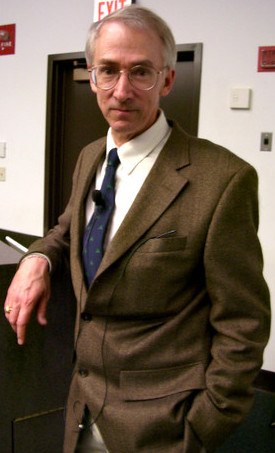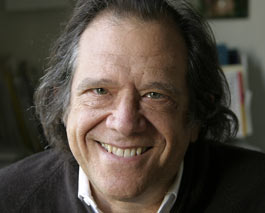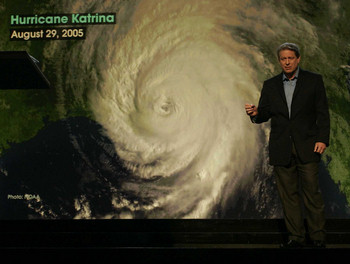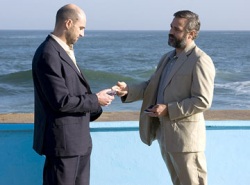Twitter Review: Milk
‘Milk’ – It neither over-simplifies nor beatifies, but in a largely glowing portrait, Harvey Milk remains a mystery. Still, a great pleasure
‘Milk’ – It neither over-simplifies nor beatifies, but in a largely glowing portrait, Harvey Milk remains a mystery. Still, a great pleasure
 In this campaign season, what can we learn from the performances of An American Carol and Religulous? The easy conclusion is that audiences aren’t real keen on such aggressively political material, with the two movies finishing ninth and 10th, respectively, in the weekend’s overall box office. The second easy conclusion is that conservatives are slightly hungrier for entertainment than people who don’t like religion. Neither is correct.
In this campaign season, what can we learn from the performances of An American Carol and Religulous? The easy conclusion is that audiences aren’t real keen on such aggressively political material, with the two movies finishing ninth and 10th, respectively, in the weekend’s overall box office. The second easy conclusion is that conservatives are slightly hungrier for entertainment than people who don’t like religion. Neither is correct.
 I find it baffling to read even marginally positive reviews of Sarah Palin’s performance in last night’s debate. I saw it the same way noted political commentator Roger Ebert did.
I find it baffling to read even marginally positive reviews of Sarah Palin’s performance in last night’s debate. I saw it the same way noted political commentator Roger Ebert did.
 In the fifth chapter of his 2007 book Evolution for Everyone: How Darwin’s Theory Can Change the Way We Think About Our Lives, David Sloan Wilson writes: “It turns out that something very similar to my desert-island thought experiment has been performed on chickens by a poultry scientist named William Muir.” That probably sounds odd. It will likely sound even odder when you find out what the desert-island thought experiment is: a set of three hypothetical situations to explore human morality through the lens of evolution.
In the fifth chapter of his 2007 book Evolution for Everyone: How Darwin’s Theory Can Change the Way We Think About Our Lives, David Sloan Wilson writes: “It turns out that something very similar to my desert-island thought experiment has been performed on chickens by a poultry scientist named William Muir.” That probably sounds odd. It will likely sound even odder when you find out what the desert-island thought experiment is: a set of three hypothetical situations to explore human morality through the lens of evolution.
 A foolish person doesn’t recognize that one can learn much from opponents. So liberals have begun to understand that they need God on their side as much as the Christian Right does. The lesson from conservatives, said Rabbi Michael Lerner, is that it’s okay to base policy on faith and spiritual values, and it’s important to stand up for what you believe in. “When they come to a decision about what they believe in, they fight for it,” he said of the Christian Right in a recent interview. “And they’re willing to lose an election for the sake of what they believe in.”
A foolish person doesn’t recognize that one can learn much from opponents. So liberals have begun to understand that they need God on their side as much as the Christian Right does. The lesson from conservatives, said Rabbi Michael Lerner, is that it’s okay to base policy on faith and spiritual values, and it’s important to stand up for what you believe in. “When they come to a decision about what they believe in, they fight for it,” he said of the Christian Right in a recent interview. “And they’re willing to lose an election for the sake of what they believe in.”
 I am admittedly writing mostly from ignorance, but I can’t see any way that the strike by the Writers Guild of America will succeed unequivocally. Yes, the writers that generate talk-show monologues, awards-show banter, and television and movie scripts will likely get some concessions from Hollywood, and will end up in a better place financially. But it will be virtually impossible for them to get their fair share – what they deserve.
I am admittedly writing mostly from ignorance, but I can’t see any way that the strike by the Writers Guild of America will succeed unequivocally. Yes, the writers that generate talk-show monologues, awards-show banter, and television and movie scripts will likely get some concessions from Hollywood, and will end up in a better place financially. But it will be virtually impossible for them to get their fair share – what they deserve.
 In the opening of 28 Weeks Later, Don (Robert Carlyle) faces a dilemma: He can leave his wife to die and run like hell on the off chance that he might outrun the “infected,” or he can stay with her and face a gruesome end. He runs like hell, and looks back to see his wife attacked. This is the movie writ small, laying the groundwork for more impossible choices.
In the opening of 28 Weeks Later, Don (Robert Carlyle) faces a dilemma: He can leave his wife to die and run like hell on the off chance that he might outrun the “infected,” or he can stay with her and face a gruesome end. He runs like hell, and looks back to see his wife attacked. This is the movie writ small, laying the groundwork for more impossible choices.
 In Davis Guggenheim’s documentary An Inconvenient Truth, a high-angle shot of George W. Bush is followed by a shot of Al Gore looking down out of an airplane window. The juxtaposition delivers a subtle but forceful message: Al Gore is God, gazing in harsh judgment on this Republican president.
In Davis Guggenheim’s documentary An Inconvenient Truth, a high-angle shot of George W. Bush is followed by a shot of Al Gore looking down out of an airplane window. The juxtaposition delivers a subtle but forceful message: Al Gore is God, gazing in harsh judgment on this Republican president.
 The film’s subject makes it bluntly political, yet Syriana nearly demands multiple viewings to even understand its plot, let alone its meanings. It is intended to illuminate that the business of oil is a dirty one, yet even people who pay close attention to the movie will come away from it more confused than enlightened.
The film’s subject makes it bluntly political, yet Syriana nearly demands multiple viewings to even understand its plot, let alone its meanings. It is intended to illuminate that the business of oil is a dirty one, yet even people who pay close attention to the movie will come away from it more confused than enlightened.
 What’s unfortunate about Michael Haneke’s Caché is that the writer/director has created a movie that requires such intensive decoding at its terminals that it’s easy to overlook the rest of the movie – to, in fact, miss its entire point. By spending so much time and effort on the beginning and the ending, we neglect essential questions: What is the film trying to say? Is this an effective way to communicate that message?
What’s unfortunate about Michael Haneke’s Caché is that the writer/director has created a movie that requires such intensive decoding at its terminals that it’s easy to overlook the rest of the movie – to, in fact, miss its entire point. By spending so much time and effort on the beginning and the ending, we neglect essential questions: What is the film trying to say? Is this an effective way to communicate that message?